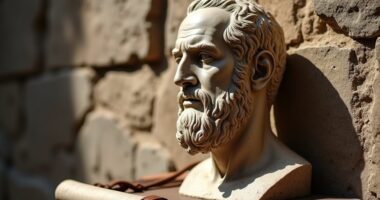Beyond the big three, explore Musonius Rufus, who emphasizes cultivating virtues like courage and temperance for moral resilience. Hierocles expands your sense of responsibility, strengthening you through ethical interconnectedness. Hieronymus highlights self-awareness and rationality as key to maintaining composure, while Posidonius blends emotional discipline with intellectual growth. These underrated thinkers provide practical insights that can help you build resilience rooted in virtue—you’ll discover even more when you look beyond the popular names.
Key Takeaways
- Musonius Rufus emphasizes cultivating virtues like courage and temperance to develop moral resilience and authentic happiness.
- Hierocles introduces the “circle of concern,” expanding ethical responsibility to foster inner strength through interconnectedness.
- Hieronymus of Rhodes highlights rationality and self-awareness as essential tools for maintaining emotional composure.
- Posidonius advocates integrating emotional discipline with intellectual growth for holistic resilience.
- Exploring these lesser-known Stoics enriches understanding of resilience rooted in virtue, self-awareness, and ethical responsibility.

Have you ever wondered if the most influential Stoic philosophers are the only ones worth knowing? While names like Marcus Aurelius, Seneca, and Epictetus dominate the conversation, many underrated thinkers contributed considerably to Stoic philosophy and can deepen your understanding of mental resilience and ethical virtues. These lesser-known figures challenge you to expand your perspective and integrate Stoic principles into everyday life more thoroughly.
One such philosopher is Musonius Rufus, a Roman Stoic teacher whose focus on practical ethics can help you develop strong moral character. Rufus emphasized that living according to nature and cultivating virtues like courage, justice, and temperance are essential for true happiness. His teachings remind you that mental resilience isn’t just about enduring hardships but actively practicing ethical virtues, such as patience and integrity, even when it’s difficult. By studying his approach, you learn that resilience is rooted in consistent virtue cultivation, making setbacks easier to withstand because your values remain firm.
Practicing virtues like courage and justice builds enduring resilience and strengthens your moral character.
Another underrated figure is Hierocles, whose concept of the “circle of concern” encourages you to expand your sense of ethical responsibility. He believed that understanding your interconnectedness with others fosters inner strength and moral clarity. When you recognize your role within the larger community, you cultivate a resilient mindset that isn’t easily shaken by personal setbacks. Hierocles’ teachings highlight that true mental resilience involves aligning your actions with your ethical virtues, promoting a sense of stability regardless of external chaos.
A lesser-known Stoic, Hieronymus of Rhodes, stressed the importance of self-awareness and rationality in maintaining composure. His insights help you see that resilience isn’t about suppressing emotions but managing them through reason and virtue. By practicing self-examination and aligning your actions with your core principles, you strengthen your mental resilience. His focus on rationality and ethics underscores that resilience arises from a disciplined mind committed to ethical virtues, which serve as your internal compass during life’s storms.
Finally, you shouldn’t overlook the influence of Posidonius, who integrated Stoic ideas with other philosophical traditions. His work encourages you to adopt a holistic approach to resilience, blending emotional discipline with intellectual growth. Recognizing that resilience involves cultivating both mental strength and ethical virtues broadens your capacity to face challenges with steadiness and integrity. These underrated philosophers remind you that Stoic resilience isn’t built overnight but through continuous effort in practicing virtues and self-awareness.
In exploring these lesser-known Stoics, you gain fresh insights into building mental resilience rooted in ethical virtues. Their teachings challenge you to look beyond the popular names and deepen your practice, helping you navigate life’s difficulties with greater strength and moral clarity.
Frequently Asked Questions
How Did Lesser-Known Stoic Philosophers Influence Modern Self-Help Practices?
Lesser-known Stoic philosophers shaped modern self-help by emphasizing personal resilience and ethical development. You can see their influence in practices that encourage emotional strength, mindfulness, and virtuous living. They teach you to control your reactions and focus on what you can change, fostering resilience against life’s challenges. Their ideas continue to inspire personal growth, helping you develop a resilient mindset rooted in ethical principles that promote lasting well-being.
Are There Any Overlooked Texts From Underrated Stoic Thinkers Worth Reading?
Imagine discovering hidden manuscripts in your grandma’s attic—there’s a thrill in uncovering overlooked texts. Many underrated Stoic thinkers offer unconventional teachings in obscure writings, worth your time. These hidden manuscripts reveal fresh perspectives on resilience, virtue, and inner peace, often ignored by mainstream philosophy. Exploring these lesser-known works broadens your understanding and deepens your practice of Stoicism, proving that sometimes, the most valuable insights are tucked away in neglected corners.
What Differences Exist Between Mainstream and Obscure Stoic Philosophies?
When comparing mainstream and obscure Stoic philosophies, you’ll notice distinct philosophical nuances shaped by their historical contexts. Mainstream ideas often focus on universal virtues, while underrated thinkers explore personal resilience and practical wisdom. You might find that obscure philosophers offer fresh perspectives that challenge traditional Stoic views. By understanding these differences, you deepen your grasp of Stoic thought and its varied applications across different eras and cultural backgrounds.
How Can I Identify Underrated Stoic Philosophers for Further Study?
You can identify underrated Stoic philosophers by investigating their recognition among scholars and exploring obscure texts that aren’t widely circulated. Look for thinkers whose ideas are cited less often but offer unique insights into Stoic principles. Research historical references and modern analyses to uncover their contributions. This approach helps you discover hidden gems in Stoic philosophy, expanding your understanding beyond the mainstream and enriching your study of the tradition.
Did Underrated Stoic Philosophers Have Unique Perspectives on Virtue?
You’ll find that underrated Stoic philosophers offer unique perspectives on virtue and virtues, often emphasizing practical wisdom and personal resilience. They challenge you to see virtue not just as moral perfection but as a daily practice. Their insights encourage you to develop inner strength, patience, and humility, highlighting that true virtue involves consistent effort. Exploring these thinkers broadens your understanding of how virtues can be integrated into everyday life.
Conclusion
As you journey beyond the familiar peaks of Stoicism, you’ll discover quiet streambeds of wisdom flowing from these lesser-known philosophers. Their insights serve as gentle whispers guiding you through life’s tempests, offering subtle illumination amid shadows. Embrace their teachings like soft sunlight filtering through a canopy, revealing hidden paths of resilience and clarity. By exploring these underrated voices, you’ll enrich your understanding and walk more confidently along your path, illuminated by their timeless, understated brilliance.









